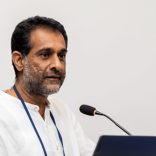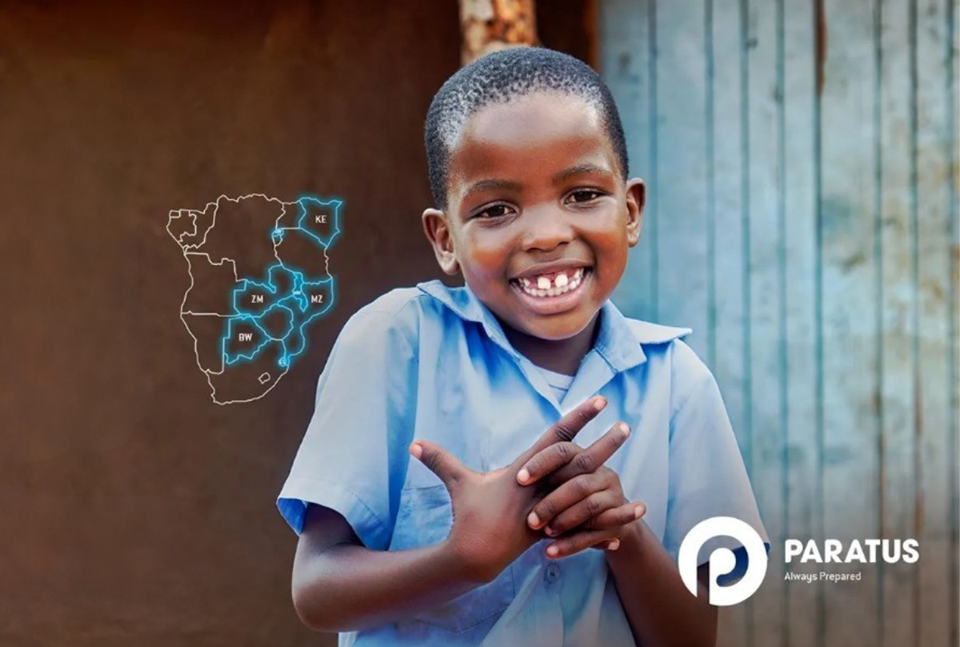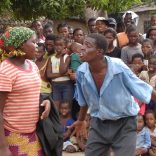Mozambique: Ilesh Jani is the new chair of the Global Task Force on Cholera Control Steering ...
Mozambique: News, reports & clippings – By Joseph Hanlon

Image: VOA
This Newsletter
- Not publishing in March
Xinavane sugar
- Strikers attack police, bosses
- Seasonal workers & some who lost land
Other news
- Chicken now all national
- Government websites hacked
- Nyusi looks for $
Cabo Delgado civil war
- Predict 3 more years of war
- Prioritise gas over development?
- Increased attacks in Nangade, Macomia
Shaped by outside forces – 1
- China escaped shock therapy; Moz did not
- This Newsletter
We will not publish in March and only irregularly in April and May. This is a one person operation done in the spare time of the editor. I will be travelling and also devoting more time to academic writing in coming months. There will be no newsletters in March and fewer than usual in April and May. I will continue to post the daily flood bulletin https://bit.ly/Moz-Flood-2022 and debt trial news https://bit.ly/Moz-Debt-Map-Trial, but not as promptly. jh
- Xinavane
Police arrest Xinavane sugar strikers who then attack police, bosses
Police crackdowns on demonstrations in Maputo have only brought complaints in the press which have been easily ignored, but when police arrested seven would-be strikers at the Xinavane sugar complex, it triggered a riot. Suddenly, two ministers rushed 90 km north of Maputo to Xinavane to mediate, and the Maputo province police head, Inacio Dina, and Manhiça district and Xinavane police commanders, were fired Thursday (24 Feb) morning.
Relations between South African owner Tongaat Hulett and the workers have been tense for some years. The secretary of the Xinavane Trade Union Committee, Orlando Chume, said a formal letter was sent to Tongatt in August last year demanding a salary increase, payment of salaries in arrears, and an end to the hiring of foreign labour. He said there was simply no response. So on 1 February workers went on strike. Talks eventually began 11 days later involving the Trade Union Committee, the Tongaat Hulett management, Manhica District Administrator Cristina de Jesus, and the central government, represented by the General Inspector of Labour, Domingos Sambo.
On Tuesday (22 Feb) police arrested seven workers, accusing them of inciting others to resume the strike and protest against the non-payment of a wage rise. Hundreds of workers and their neighbours went to the police station on Wednesday, only to discover to discover that the men had already been taken to the Manhiça district command, so they attacked and damaged the Xinavane police station. The angry crowd then burned the homes of the head of the Xinavane Administrative Post and the head of the company’s internal security and other senior managers, as were five cars. Police arrested 26 demonstrators, but then released some of them.
Police commandant-general Bernardino Rafael said yesterday that 27 people are detained and will be prosecuted.
State television TVM reports that the sugar workers have “broad public support.”
Deputy Minister of Labour, Rolinho Farnela, went to Xinavane on Wednesday afternoon and Agriculture and Rural Development minister, Celso Correia, who is the government firefighter, was sent Thursday. (O Pais, Carta de Moçambique, AIM, Zitamar, MediaFax, RM, TVM, Lusa)
Tongaat Hulett runs the Mafambisse and Xinavane sugar estates and claims to be the largest private sector employer in Mozambique. But it has a long history of mismanagement. In 2019 it was found to have overstated profits over a several years by nearly $1 billion. Its share price has fallen by 96%. The company is suing two former CEOs and a former finance executive for $29 million. (News 24, 11 Jan 2022)
Moneyweb (18 Jan) reported that the company had a market capitalisation of only $50 mn with unsustainable debts of $425 mn and had agreed a fundraising proposal of Zimbabwe’s billionaire Rudland family which was opposed by many shareholders.
Marcelo Mosse: violence led by seasonal workers and those who lost land
“The violent strike was not led by permanent workers. It was seasonal workers and communities, whose land was taken as part of the sugarcane expansion, who decided to rebel,” writes Marcelo Mosse, editor of Carta de Moçambique in a very clear analysis.
In response to the company’s financial crisis “Management increased the workload but did not review salaries, laid off seasonal workers and froze social responsibility that helped local communities with Health and Education. Their land has been integrated into the sugarcane plantation; they live off small beds with vegetables. The new management has withdrawn the supports. But the perks for the expatriate staff are whopping.”
“What happened in Xinavane Wednesday was not a mere exacerbation of labour conflict. It was a reflection of an erratic land management in Mozambique, which favours big capital to the detriment of peasant populations.”
Because I think Mosse’s article is important and explains the violence, I have done an English translation, on https://bit.ly/Moz-Mosse-Xinavane
The full article in Portuguese is on https://www.lusa.pt/article/35821684/governo-moçambicano-defende-dialogo-face-a-tumultos-em-xinavane-newsletter
And there is a land conflict in Gaza, in Mucatine, Massingir district. Some members of the Mucatine community say there was lack of transparency in the concession of 2,000 hectares to Massingir Vale Farms, which intends to produce maize, beans and elephant grass. Community representative Eusebio Valoi says that the concession of the land parcel left some residents without space for agriculture or cattle grazing. But the administrator of the Massingir district, Esmeralda Muthemba, blames a small group of people who, she says, want to make the $45 mn development of the district unfeasible. (Radio Moçambique 24 Feb)
- Other news
Mozambique finally produces all its own chicken
Increased availability of soya and maize for feed and an expansion of the number of poultry producers means that Mozambique produced 136,000 tonnes of chicken meat last year, which is 98% of national demand, the Ministry of Agriculture announced on 21 February. Production was up 13% on 2020. (Carta de Moçambique).
This sector was half of the title of our 2014 book Chickens and Beer (https://bit.ly/Chickens-Beer) and the success of the chicken sector is usually ignored because if violated all the rules of the aid industry. Instead of following the rules that the private sector must develop the country, it followed the rule that the state creates capitalism.
Local chicken could not compete on price with imported Brazilian frozen chicken, in part because of the cost of feed. In 2004 local production was only 4000 tonnes of chicken meat – just 3% of last year’s production. Soya was introduced as new crop in Gurue in 2004 and local small farmers received significant support, including funds, ploughing, and – most importantly – a guaranteed market. By 2012 when we did the book research, there were 4200 soya farmers in Gurue, most with less than 1 hectare of soya. Since then, soya growing has boomed. It no longer needs subsidy and prices are low enough to make chicken production viable. But it took a decade of outside support to create thousands of local family commercial farmers. Initially, large foreign investment failed to produce soya or chickens, and indeed killed a local success, Frango King, and took land from local farmers.
The key lesson was to not leave it to the private sector. Instead it was a dozen institutions working closely with local farmers, involving hard work and learning from experience. Key was reducing risk for small peasant farmers by supplying inputs and other help and especially by guaranteeing a market. A decade later, there were commercial farmers running the industry themselves; they became the private sector. And the crop was expanding, for example replacing tobacco in Angonia. Government and aid industry now praises the chicken industry, but refuse to learn from how it became a success.
Government websites hacked
Government websites were hacked over the 19-20 February weekend, taken off line, put up again from backups, and hacked again on Tuesday. Sites included the Defence Ministry, National Road Transport Institute (INATRO) which issues driving licences, National Institute for Disaster Risk Management (INGD), the National Roads Administration (ANE), and the Southern Regional Water Board (ARA-Sul).
The Director of the National Institute of Electronic Government (INAGE), Erminio Jasse, downplayed the attacks, stressing that sites were taken off line as soon as the attacked were noted, and that there were full backups that were used to put the sites back into action.
But Carta de Moçambique (22 Feb) cites an information technology specialist that “the websites attacked are public access, so there is no confidential information to protect. This attack was to deliver a message associated with the Islamic State. Putting more than 30 Mozambican websites with images associated to the Islamic State is a successful attack, unfortunately. … This type of attack leaves marks; the hackers plant small programmes (scripts) in the attacked servers, which at any moment can condition the functioning of the systems. ”
The hackers call themselves the “Yemen Cyber Army” and post a message and photo associated with the Islamic State. On the INATRO website the hackers put the message “We warn the government that you are completely infiltrated, including 34 Ministries of your government. If the amount of $20,000,000 is not transferred in Bitcoin, confidential data will be leaked, including the Ministry of Defense and all officials’ information and secret emails. The time limit is 24 hours…… Bitcoin wallet number: {{3FeFeloLRiGhXmvwW6UYowWEt8PZjCab8W}} [!] Gz-:[!] Y.C.A.”
The message was also apparently on the cached page of the Ministry of Defence, meaning it had been put there before the regular backup was done, and before the attack was noticed.
Mozambique has a very poor record of maintaining website. Those opening Mozambican government websites will often see a message that the website is not secure – an open invitation to hackers. The name INATRO was adopted in July last year for driving licences, but the website still has the old name INATTER. The website is the least of its problems as the agency had to stop issuing driving licences early this year because it could not pay $627,000 it owned to licence producer Brithol Michcoma. (Noticias 13 Jan)
Nyusi travelling the world looking for money
President Filipe Nyusi was in Brussels for the 6th Europe-Africa Summit with foreign and industry ministers Verónica Macamo and Carlos Mesquita trying to drum up investment and finance. After a meeting with French President Emmanuel Macron, current President of the European Union (EU), on 18 February, Nyusi, said that Rwandan and SADC troops “may” receive financial support from the EU. They also discussed the problems of TotalEnergies, which ahs stopped work on Cabo Delgado gas.
On the sidelines of the Europe-Africa Summit, Nyusi also met with Macky Sall, President of Senegal and current President of the African Union. Nyusi said “we expect support from the African Union” and the most important thing was for the AU to provide military equipment.
Next he went for an unreported stop in Dubai. On 20 February he went on to Doha, Qatar, for the Summit of the Gas Exporting Countries Forum (GECF), which agreed on 21 February to admit Mozambique as observer member. Current GECF observers include Malaysia, Norway, Iraq, Peru, Azerbaijan and the United Arab Emirates. The GECF comprises Algeria, Bolivia, Egypt, Equatorial Guinea, Iran, Libya, Nigeria, Qatar, Russia, Trinidad and Tobago and Venezuela, which account for 66% of global Liquefied Natural Gas (LNG) trade.
Iranian President Ebrahim Raisi told President Nyusi on 22 February that Western countries want Africa for themselves and while Iran wants Africa for Africans. “In the view of the Islamic Republic of Iran, African countries are lands full of talents and rich resources, which have unfortunately been plundered by Western countries for the past few centuries,” he said. Nyusi said he wanted help in developing natural resources and combatting terrorists. They met on the sidelines of the GECF in Doha.
Also on the sidelines of the meeting Nyusi met the Emir of Qatar Tamim bin Hamad Al Thani and Deputy Prime Minister and Minister of State for Defence Affairs Khalid bin Mohamed Al Attiyah. At a meeting with Qatar Chamber of Commerce officials, Nyusi called for Qatari investment in tourism, mining, ports development, real estate, and infrastructure. Mozambique will push for investment at the Mozambique-Dubai Business Forum in Dubai 28 March.
Also on the sidelines of the meeting Qatar’s Minister of State for Energy Affairs H E Saad bin Sherida Al Kaabi met Minister of Energy and Mineral Resources Max Tonela.
- Cabo Delgado civil war
At least 3 more years of war says IJR, because youth so easily recruited
It is optimistic to expect the war to end in three years, the South Africa based Institute for Justice and Reconciliation (IJR) says in a report published 13 January. The report “Building youth resilience to extremism in Mozambique” is based on focus groups with young people in Cabo Delgado.
“Youth are disproportionately at risk from extremism, particularly in situations where they have little to lose. In Mozambique, the challenges of poverty, unemployment, low levels of participation in governance and the lack of inclusive development are stark,” IJR says.
“Material considerations are significant drivers of violent extremism in Cabo Delgado. When it comes to recruitment, desperation stemming from persistent poverty was a leading push factor cited by participants. This is largely owing to the high prevalence of hunger, unemployment among youth, a lack of education and skills, and perceptions that the youth in the province are being systematically denied income-earning opportunities. Promises of food and money are used to lure young people into mosques where manipulated religious messages are being preached.”
“A small but well-connected elite in Cabo Delgado has positioned itself to capture what national wealth does make its way up north. As such, corruption is at the heart of ethnic minorities’ grievances with the state.”
The estimate of three years to end the war was given by Cristóvao Chume at a summit of Mozambican, SAMIM, and Rwandan in Mocimboa da Praia on 13 October 2021. (Cabo Ligado 19 Oct 2021) At the time he was army commander, but a month later was named Minister of Defence. However IJR considers three years to end to the war to be optimistic, in part because it “is clear is that the growth of the rebellion has succeeded due to the recruitment of ordinary Mozambicans, disenfranchised with the government and their opportunities for the future.”
Summary and key insights are on https://www.ijr.org.za/home/wp-content/uploads/2022/01/800543-IJR-Mozambique-Key-Insights_WEB.pdf and the full report on
https://www.ijr.org.za/home/wp-content/uploads/2022/01/800543-IJR-Mozambique-Report_WEB.pdf
Government will prioritise security for gas rather than development needed to create peace, warns GI-TOC
“The prevailing view in Mozambique is that the government will prioritize security for gas developments in Cabo Delgado, rather than sustainable development for the local population and improved governance. This would create the risk of a resurgence of violence, making northern Mozambique a source of continuing instability,” warns the Global Initiative Against Transnational Organized Crime (GI-TOC’s) in its 23 February report “Insurgency, illicit markets and corruption.” https://globalinitiative.net/analysis/mozambique-cabo-delgado-conflict/
“The drivers of extremism still remain in Cabo Delgado and throughout northern Mozambique. To create a sustainable peace in the region, the government needs to invest in local development and ensure that such investment is transparent to local communities, establish service-oriented and transparent local governance and address the drivers of corruption. Civil society must be afforded the freedom to play a meaningful role in conflict resolution, the press must be given unimpeded access to report openly and the international community must provide direct support to the region and play a watchdog role over human rights abuses perpetrated by police and military.”
And the war continues with increased attacks in Nangade and Macomia
Meanwhile, the war continues with ACLED recording 44 organized political violence events in January, resulting in 74 fatalities. This is during the rainy season and nearly double the number of attacks as in January 2021 and 2000. The map of the January attacks shows they were mainly in Nangade district and along the N380 road in Macomia and Meluco districts. (Cabo Ligado Monthly: January 2022,18 Feb, https://www.caboligado.com/monthly-reports/cabo-ligado-monthly-jan-2022)
In February fighting continued in Nangade and Macomia districts. In the northwest of Macomia district near the main N380 road, on 23 February insurgents attack the police post in 6th Congress, near Chai, which is the base for one the new “independent” anti-insurgent units that are part of the riot police (UIR). The attacking insurgents were described as well-equipped and trained, and the independent unit fled. But one police trainee failed to escape and was beheaded and his arms and legs cut off. An army post was also attacked that day in Litamanda, close to Chai. (MediaFax 25 Feb).
Rwandian soldiers are still fighting insurgents in Palma district. In attacks on Nhica do Rovuma and Pundanhar, 40 and 50 km west of Palma town, they killed seven insurgents and pushed the others out of their temporary camps.
But the insurgents were only west into Nangade district. At least two groups attacked 18-20 February; one group had at least 50 insurgents, reported MediaFax (23 Feb). Nangade town was also attacked as they moved west across the district, and were largely unopposed. Later in the week a group occupied the village of Muia for three days, killing members of the local militia and civilians. Insurgent attacks on five villages (including Muia) near the Tanzania border killed at least 11 people. (Lusa 22, 23, 25 Feb)
“Local sources in Nangade have related this week a significant level of dissatisfaction on the ground with the protection offered by SAMIM, with a widely held view being that scarce weapons are wasted in the hands of SAMIM troops,” reports Cabo Ligado (23 Feb)
Seventeen schools have been closed in Meluco district as a result of armed attacks since January, district administrator Paulo Lilanda said. (Radio Mozambique 22 Feb)
The South Africa special forces group. which is that country’s main contribution to the (SADC) Mission in Mozambique (SAMIM), will now be rotated out and replaced by another special forces group. But the force will be increased by a second combat group from infantry and parachute battalions. Between 60 and 80 armoured personnel carriers (mostly Casspirs) are expected to be sent to Pemba. (News24, 12 Feb; DefenceWeb 24 Feb) But South Africa is struggling to fund its participation.
The 2021 Mozambique State Budget outcome report shows that government spent almost double the amount on defence, security and public order (17% of spending) as on health (9%), and that actual spending on health was cut back to only 82% of what was planned. (Carta de Moçambique 22 Feb)
- Local history shaped by outside forces – 1
How China escaped shock therapy and Mozambique did not
The crises that bedevil Mozambique today are shaped by the way Mozambicans grappled with outside forces – colonialism, the cold war, neoliberal globalisation, etc. These experiences are now more widely understood and in the past year several books have been published, notably about how other countries were able to make other choices. As time permits, I will review some of these books in coming newsletters. I start with how China and Mozambique grappled with the move to a market economy in the late 1980s, and made opposite choices.
How China escaped shock therapy: The market reform debate, by Isabella M Weber, Routledge, 2021.
In the late 1980s China, Russia, Mozambique and many other countries saw the need to move to a more market-based economy. But how to do it? US economists and the World Bank and IMF promoted what became known as “shock therapy” – make the transition to the market economy all at once. Knock down the entire economic edifice and clear the ground for the free market to build something new.
Isabella Weber’s book is about a remarkable period of open debate in China. Chinese economists knew all the US literature and studied Germany and the US after World War II as well as Brazil and other countries. Top World Bank officials visited China and talked with economists and leaders, and pushed shock therapy. But China also has a long history of economic study and experiment. One of the oldest economic texts is included in the Guanzi, published in its revised form in 26 BCE – nearly 2000 years ago. The Guanzi tackles issues like peasant marketing, a very timely issue now, and it calls for what we would now call marketing boards that buy surplus from peasants and store the surplus, and then sell it back to them when food is short but at a reasonable price, preventing profiteering by traders. This ancient policy of state intervention is now opposed by neo-liberals and shock therapists, who want traders to be allowed to make large profits.
China had several historic interventions to stop hyperinflation. Most important was the Communists successfully halting inflation during the civil war in the late 1940. Recreating and integrating markets through state trading agencies built a stable economy in Communist zones while the Nationalist free market, with US advice, did not. The stable economy played a central role in the Communists winning the civil war. This became known as the “step by step” process – it could be done rapidly, but each step had to be secured before moving forward.
Debates were extensive and public. And it was close run, but in 1986 the step-by-step market reformers won. They moved quickly but it was not a big bang; as they said, the “invisible hand” of the market was guided by the “visible hand” of the state. Russia made the other choice, and opted for a big bang shock therapy. Weber compares the two. Russia had hyperinflation and no GDP growth; China had huge GDP growth and limited inflation. The state could build the market economy, but the free market on its own could not.
What make this book most striking is that the same debate was going on in Mozambique at the same time. Of course, a major war was under way. President Samora Machel had opened the move to a market economy with his famous 1979 comment that “the state does not sell needles”. Machel was killed in 1986. And in a move similar to the Chinese, Frelimo realised it had to move to a market economy, and in a step-by-step way started on its own. The first market reforms came in 1986 and the Economic Reform Programme (PRE) in 1987. The World Bank and IMF already wanted Shock Therapy, but Mozambique’s economic leaders resisted and went step by step. Despite the on-going war, GDP per capita stopped falling and actually rose from 1988 to 1990. Frelimo’s own step by step brought growth in war.
In China, the IMF and World had no power but persuasion, and they lost. But Mozambique was being destroyed by the proxy war and by 1990 the IMF had total power. It imposed shock therapy. GDP per capita dropped dramatically until 1995. The war ended in 1992 but there was no peace dividend and GDP per capita was lower than at any time during the war.
China vs Russia and Mozambique before are after are comparison case studies – step by step market reform worked, and shock therapy did not. The IMF was forced to ease up a bit on Mozambique from 1995, but never totally. Today’s increasing poverty and inequality were the results in Russia and Mozambique. Weber’s book How China escaped shock therapy is definitely worth reading to see how a country made the other choice and won. (e-book $34)
Mozambique’s step by step period is outlined in my book Mozambique: Who Calls the Shots (1991) and the shock therapy period in Peace Without Profit: How the IMF Blocks Rebuilding (1996). Both books can be downloaded free on http://bit.ly/Hanlon-books
By Joseph Hanlon













Leave a Reply
Be the First to Comment!
You must be logged in to post a comment.
You must be logged in to post a comment.